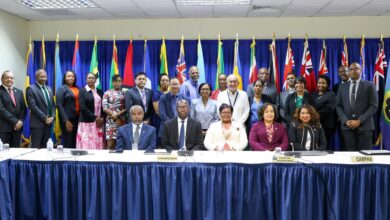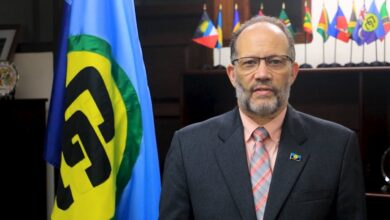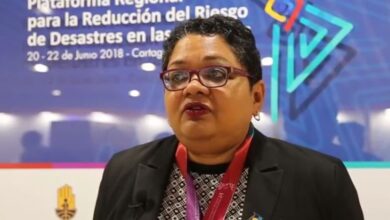It is truly an honour and a privilege for me today to address this Inauguration Ceremony marking the Second Term of Office of this distinguished daughter of the Caribbean and of Dominica.
As a fellow Dominican, I note with pride that the achievements of Dr. Carissa Etienne over the first five years of her tenure as Director of the Hemisphere’s premier Health Agency have earned her re-election to a second term.
It is clear, Dr. Etienne, that the reward for good work is more hard work! Your accomplishments are to be applauded.
The Americas and the World health system are benefitting from your skills and talents which were well honed while making your outstanding contribution to the health sector in your native land and the wider Caribbean Community (CARICOM).
Your dynamic leadership transformed the primary health care system in Dominica, bringing health care to the communities. I had the privilege of witnessing this personally as I was part of the public service at the same time.
This was an early reflection of the vision that you have to improve health care for all peoples of the Americas, including the poor, the vulnerable and the marginalised.
It is a focus that you have maintained at the international level when as Assistant Director General of the World Health Organisation (WHO) you led the global renewal of the primary health care (PHC) approach.
You also led WHO's work on universal coverage. This was highlighted by the development of an action agenda for countries at all stages of development to achieve universal coverage and improve health outcomes. That agenda also proposed ways that the international community could better support efforts in low income countries.
Your achievements in the first term of Office have surely served to further burnish your reputation. You have instituted administrative and management changes to improve the efficiency and effectiveness of PAHO.
In the field, it was PAHO who led the successful response to public health emergencies in the Americas such as Zika, Chikungunya and cholera. PAHO’s interventions succeeded to the extent that there has been a dramatic decline in reported cases of these diseases.
Last September, as the wider Caribbean Region reeled from the disastrous effects of Hurricanes Harvey, Irma and Maria, PAHO was among the earliest responders who partnered in efforts at relief and recovery.
On behalf of the Caribbean Community and our affected Member States in particular, I want to take this opportunity to express our heartfelt appreciation for the continued assistance rendered.
The role of health organisations such as PAHO in disaster management and recovery is critical.
The health and environmental conditions on the affected islands in the immediate aftermath of the hurricanes posed a serious threat to the well-being of the people.
The psychological trauma which afflicted those devastated by the loss of loved ones, as well as their property and belongings also had to be addressed. Again this Organisation, under your leadership, was instrumental in providing assistance in that regard.
Given the severe climatic events of last September, it is a matter of great concern that all known science points to the fact that more intense and more frequent mega storms will be the new normal for the Region. Our Region has also been experiencing severe drought and catastrophic rainfall in the off-seasons.
Those hurricanes and other severe climatic events occurred with a global temperature rise of approximately one degree Centigrade [1˚C] above pre-industrial levels. If the current rate of emissions of greenhouse gases continues, it is estimated that the world could end up three or four degrees warmer.
At COP 21 in Paris in 2015 the world agreed to “hold the increase in the global average temperature to well below 2°C above pre-industrial levels and pursue efforts to limit the temperature increase to 1.5°C”.
For us as Small Island and Low-Lying Coastal Developing States (SIDS), which are highly vulnerable to climatic hazards, global warming beyond 1.5 is an existential threat.
Moreover, since Paris, Caribbean scientists have carried out climate modelling to determine the consequences of both a 1.5 and 2.0 degree warmer world.
They have concluded that with the current trend, the 1.5 degrees will occur within the next decade, much sooner than previously anticipated. With 1.5 degrees, the scientists are predicting much harsher climatic conditions.
For our Region, which has been designated as one of the most natural disaster-prone in the world, it is now imperative and urgent that we make ourselves more resilient to the effects of climate change. And that includes resilience in the health sector.
The reality is that we are living climate change. It is our new normal.
As we look after the reconstruction of our devastated countries, health sector resilience will be pursued within a broader goal of building a resilient Caribbean Community in all facets – economically, socially, environmentally and technologically.
The magnitude of reconstruction will require significant levels of financing which we are unable to generate on our own. The other countries across the Region also need resources to become more resilient as we face the new normal of the increasing effects of climate change. We have to prepare for the next hurricane season.
While we commit ourselves to that goal, we are doing so at a time when our Community is combatting serious economic and financial challenges due in large measure to external shocks. Resources are limited.
The situation is further exacerbated by the continuing denial of access to concessional development financing for most of our Member States all of which are vulnerable SIDS
The use of GDP per capita as the primary criterion for such access is a major stumbling block. That measure has resulted in many of our Member States being designated as middle- income countries, thus being graduated out of access.
Now more than ever there is an urgent need to change the criteria for concessional development financing. The inherent vulnerability of SIDS demands that this criteria be changed by multilateral financing institutions.
A recent decision by the Board of the Green Climate Fund to deny funding to one of the Pacific Islands because of their per capita income is unacceptable. Small vulnerable countries in the quest for resilience against climate change must never be denied much needed concessional financing.
We must all advocate for the measure to be removed as it would help to provide some fiscal space to help in addressing the numerous challenges we face including threats to our citizens’ health.
The WHO has recognised that climate change is one of the greatest threats to human health and the environment, as it affects the social and environmental determinants of health – clean air, safe drinking water, sufficient food and secure shelter.
Already the world is experiencing an increased incidence and severity of extreme weather events including floods, storm surges and prolonged drought.
These events will cause an escalation in climate-sensitive diseases such as malaria, dengue, cholera and other vector-borne diseases.
The WHO further asserts that between 2030 and 2050, climate change is expected to cause approximately 250,000 additional deaths per year, from malnutrition, malaria, diarrhoea and heat stress. This does not take into account the loss of life from the mega storms. The direct damage costs to health is estimated to be between US$2-4 billion per year by 2030.
The United Nations Framework Convention on Climate Change (UNFCCC), and the Paris Agreement recognise that SIDS are especially vulnerable to the adverse effects of climate change.
In 2016, at the Second Global Conference on Health and Climate to support the implementation of the Paris Climate Agreement, participants called for “scaling-up financial investments in climate change and health, and developing a new approach to link health, economics and climate change”.
Despite the recognition of the strong links, the WHO reports that less than 1.5% of international finance for climate change adaptation is currently allocated to health projects. It is therefore crucial to increase the level of investment of climate finance for health.
I note that Dr Tedros Ghebreyesus, the WHO Director-General, has made “health impacts of climate and environmental change” one of the four health priorities for his mandate.
I must commend him and his Organisation for the Special Initiative on Climate Change and Health. It recognises that “although all populations are at risk, some are more vulnerable than others. And SIDS are in the front line.”
Prime Minister Roosevelt Skerrit of Dominica, could have been speaking for all SIDS when he said during an address to the United Nations shortly after the devastation of Hurricane Maria: “today, 72,000 Dominicans lie on the front line in a war they did not choose, with extensive casualties from a war that they did not start!”
“Addressing health effects of climate change in small island states and vulnerable settings”, is a flagship programme under the WHO Global Programme of Work 2019-2023. This is fully in keeping with the attainment of the UN Sustainable Development Goal (SDG) 13, which requires us to “take urgent action to combat climate change and its impacts”.
I have no doubt, Dr. Etienne, the WHO initiative that all health systems in SIDS are resilient to climate variability and change by 2030, will be on your Agenda over the next five years. The work PAHO is coordinating with its Healthy Hospitals initiative and reinvigorated approaches to vector control is very significant in this regard.
I note that among your priorities for this second term is to ensure that the Americas are on course to reduce NCD mortality by 25 percent by 2025 and by 33 percent by 2030.
PAHO has been demonstrating true Leadership in support of the establishment of the Legislative and Regulatory Frameworks to address the challenges of Tobacco control, Diet and Exercise and Alcohol consumption.
Unfortunately, mortality in CARICOM from NCDs remains the highest in the Hemisphere. Forty percent of NCD deaths occur prematurely, in those under 70, and are potentially preventable. Our diabetes prevalence is double global rates and more than 33 percent higher than Latin America.
Obesity in children represents the greatest threat to the health of future generations. In many CARICOM Member States, the level of overweight and obesity is more than 30 percent in both primary and secondary school populations as against the Hemispheric rate of 25 percent.
This does not augur well for controlling NCDs. Caribbean progress towards global targets with respect to the risk factors for NCDs remains less than satisfactory.
Stronger emphasis needs to be placed on physical exercise. Responsibility starts with the individual. We need to improve our legislative and regulatory framework with respect to the labelling and advertising of tobacco products and alcohol. More of our Member States also need to put in place legislation with respect to reducing the content of sugar in manufactured products.
At their Meeting last July, the CARICOM Heads of Government recommitted themselves to the promotion of healthy lifestyles to combat the epidemic of NCDs.
This issue is one which our Community brought to global attention and is once again the focus of a UN High-Level Meeting in New York in September.
Madam Director, I wish to commend you and your team for your support of the goal to Eliminate Mother to Child Transmission of HIV and Syphilis. Since 2015 seven countries in the Caribbean led by Cuba, the first in the world, have achieved that goal.
As you said last December “this elimination is a remarkable achievement that puts the Americas at the forefront of the global effort to ensure that no child is born with HIV or congenital syphilis.”
The countries which have achieved that goal deserve our congratulations as does the Pan Caribbean Partnership Against HIV and AIDS (PANCAP), the lead agency in the Region for combatting the disease.
PAHO’s programmes to eradicate tuberculosis, malaria and other related diseases have been making significant headway. These efforts, however, can easily be frustrated by recent events in the Americas.
The outbreak of an old disease, diphtheria, is a reminder that if we fail to maintain high levels of vaccine coverage these diseases can re-emerge.
Madam Director, your Organisation continues to be a valued partner for our Community. PAHO continues to play a significant role in the Caribbean Cooperation in Health.
This is a mechanism through which Member States of the Caribbean Community collectively, focus action and resources over a given period, towards the achievement of agreed objectives in priority health areas of common concerns.
That concept of collective action has formed the basis for the PAHO Sub-Regional Cooperation Strategy in other areas of the Americas.
The latest version of the mechanism has seen a restoration of the capacities in the PAHO sub-Regional office in Barbados, which will greatly support the roll out of the programme.
Additionally, your support to and co-operation with Caribbean Public Health Agency (CARPHA) has been invaluable to our Region.
As you embark on your second term, it is noteworthy that one of your prime priorities is reflected in Goal 3 of the UNSDGs which seeks to ensure healthy lives and promote well-being for all, at all ages.
It resonates with your life’s goal to provide universal health coverage, access to quality essential health-care services, and access to safe, effective, quality and affordable essential medicines and vaccines for all.
Judging by what you have achieved in your first term, who can doubt that you will attain the ambitious targets that you have set yourself in going forward.
I am sure that I speak for all your constituents when I say we stand ready to support and partner with you.
I offer my personal best wishes to you for a successful second term which will undoubtedly surpass the splendid achievements of your first.
Best Wishes to you and your family!





